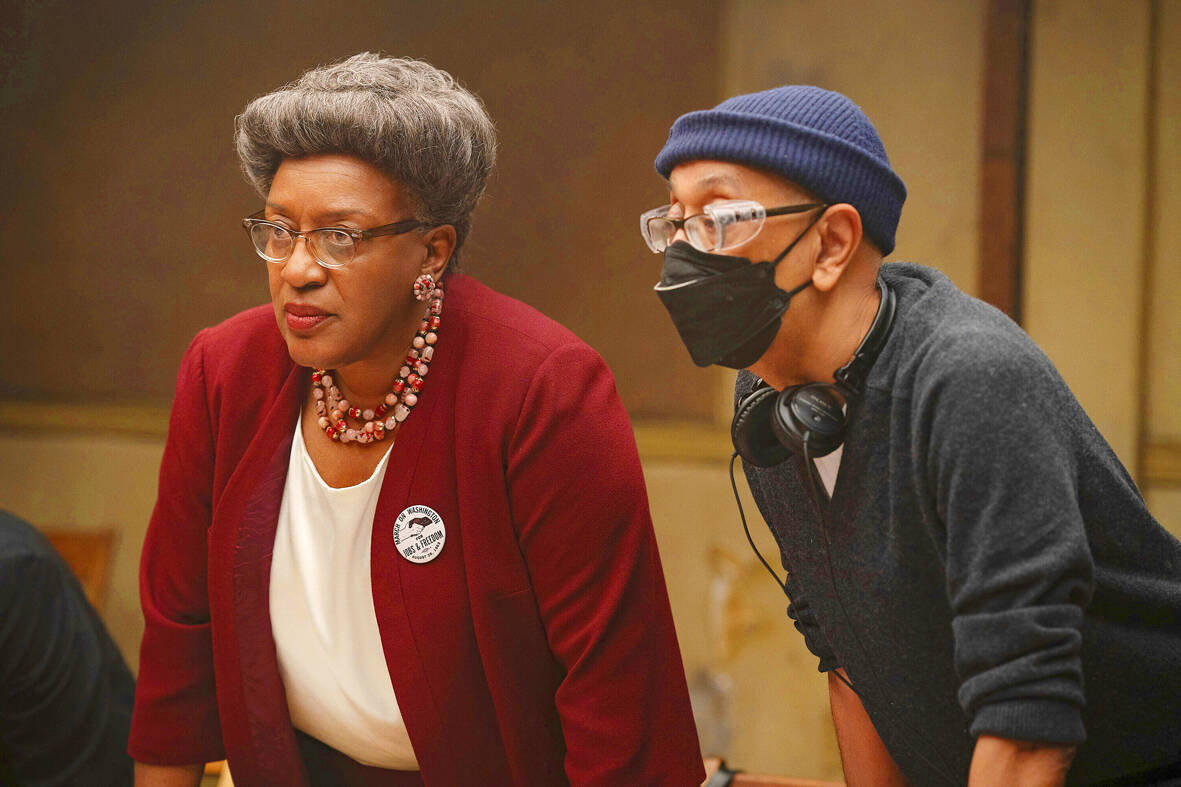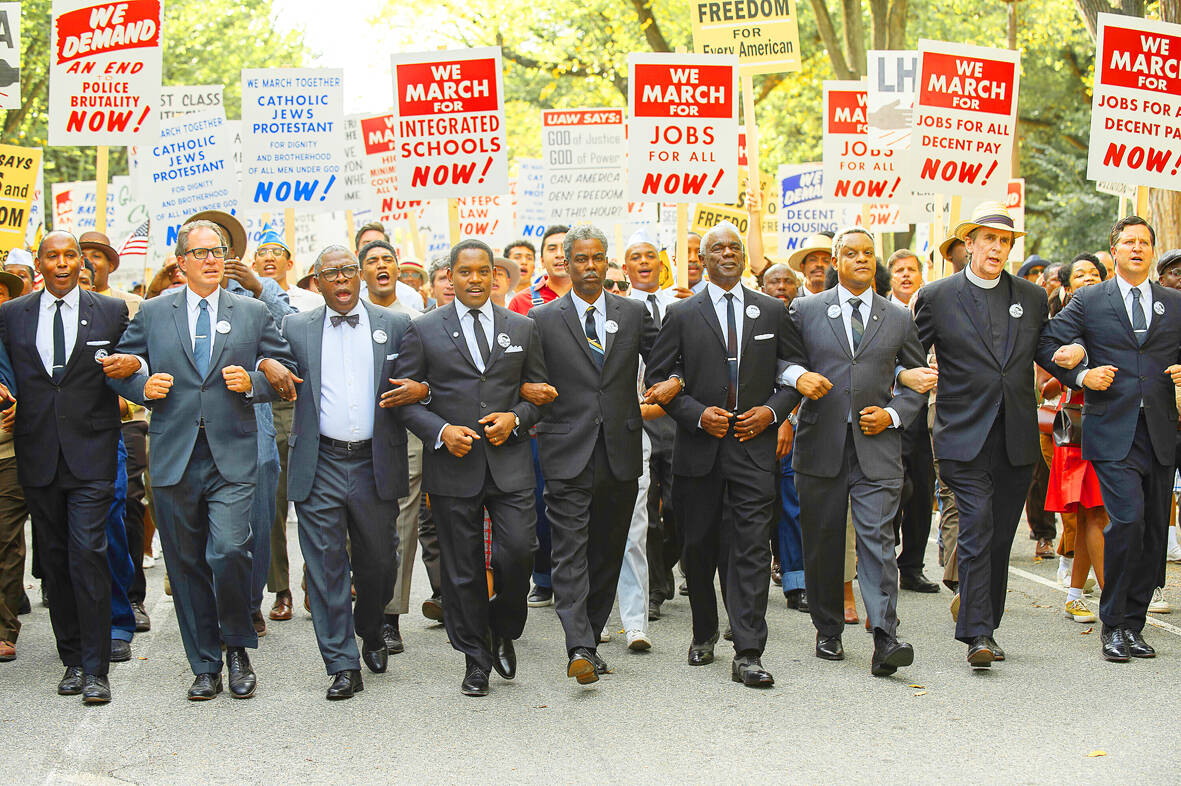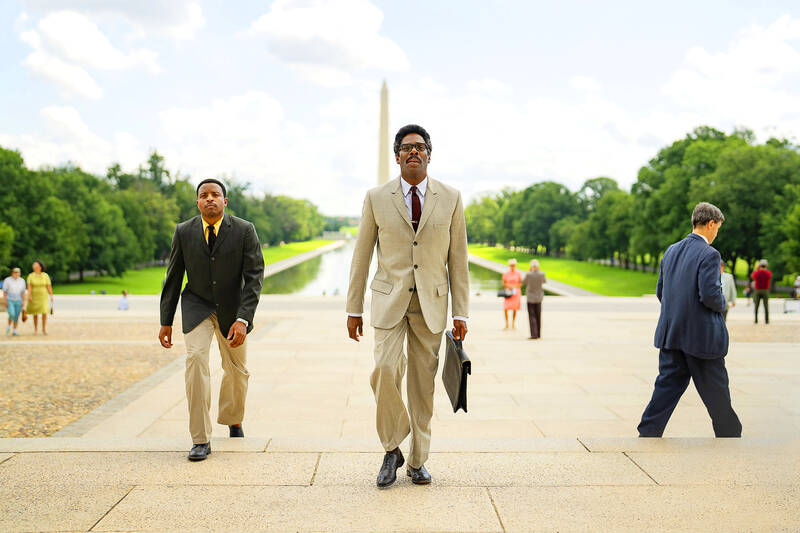The 1963 March on Washington drew an estimated 250,000 people from across the country — the largest march at that point in American history — and was the place where the Reverend Martin Luther King Jr delivered his iconic “I Have a Dream” speech.
It likely wouldn’t have happened without the work of a master strategist: Bayard Rustin, a gay Black socialist and pacifist-activist from Pennsylvania, whose close friendship with King was the engine in the early days of the Civil Rights Movement.
The winning, triumphant Netflix movie Rustin explores the stressful weeks leading up to the march from the grassroots level, with Colman Domingo starring as the organizer who many people know nothing about.

Photo: AP
It was he who wrangled 80,000 boxed lunches, 22 first aid stations, six water tanks, 2,200 chartered buses, six chartered flights, 292 latrines, over 1,000 Black police officers and a change to the city’s subway schedule, not to mention snagging celebrities like Marlon Brando, Charlton Heston, Lena Horne and James Baldwin.
Domingo is debonair, frisky, droll, passionate and utterly captivating as Rustin — the film representing the electric meeting of winning material with the perfect performer.
“You’re irrelevant,” Rustin is told at an after-work get-together by a more militant activist. “It’s Friday night. I’ve been called worse,” Rustin responds, taking a sip of his cocktail.

Photo: AP
But as wonderful as Domingo is, it’s the astonishing amount of talent in front of and behind the camera that will take your breath away. No matter how small, each performance brings fire and makes the most of a few minutes on camera.
Is that Jeffrey Wright as a dour representative Adam Clayton Powell? Yes, indeed. Wait, isn’t that Adrienne Warren? Yup. Kevin Mambo and Audra McDonald, too? Yes and yes. Chris Rock ages up to play a stuffy NAACP Executive Secretary Roy Wilkins and Glynn Turman is awesome, as always, as labor leader A Philip Randolph.
Da’Vine Joy Randolph plays Mahalia Jackson, Michael Potts is “Cleve” Robinson, CCH Pounder as Dr Anna Hegeman, appropriately, gets her own warm round of applause during the movie. And Aml Ameen plays an understated King, his moments with Rustin playing like two old friends.

Photo: AP
There’s excellence in the music — Branford Marsalis provides the jazzy score, including lonely sax solos and mournful double bass plucks — and Lenny Kravitz contributed an original song, Road to Freedom.
The biopic has a presidential seal or at least a former presidential seal — Barack Obama and Michelle Obama’s Higher Ground produced. (Obama awarded Rustin a posthumous Presidential Medal of Freedom.)
Rustin is more than just the public-facing story of how the March on Washington came about. It’s also a portrait of a man who has to hide his sexuality. If it was widely known, his career, the march and maybe even the Civil Rights Movement itself could be at risk.
Domingo shows the immense pressures faced by being a religiously-raised, Black gay man in the racist and homophobic 1960s, enough psychic forces to tear a man apart.
“On the day that I was born Black, I was also born a homosexual,” Rustin tells King before a crucial meeting with Black leadership. “They either believe in freedom and justice for all or they do not.”
Director George C Wolfe, a theater legend, keeps this biopic intriguing, making it almost feel like a caper. Will they pull off their audacious effort? Of course, but the twists and turns endured make organizing the march a bit like the rush to get a big musical on its feet. Wolfe adds that energy.
The screenplay by Julian Breece and Dustin Lance Black isn’t shy about exposing the divides within the movement and the ugly homophobic feelings of the era. There is a smart flashback to 1942 when the camera goes to black and white.
The movie takes viewers to places perhaps unfamiliar, like to training sessions where Black police officers were taught about nonviolence and to Manhattan apartments where protesters would talk about their own stories of segregation to convince rich white folks to contribute money for buses.
The final section — the actual march itself — mixes new footage with some from that day. There was some fear by the organizers that not enough people would come, but the hero of Rustin doesn’t waver — and is seen bluffing with reporters right up until the end. Rustin is as vibrant as the movement it covers.

On April 26, The Lancet published a letter from two doctors at Taichung-based China Medical University Hospital (CMUH) warning that “Taiwan’s Health Care System is on the Brink of Collapse.” The authors said that “Years of policy inaction and mismanagement of resources have led to the National Health Insurance system operating under unsustainable conditions.” The pushback was immediate. Errors in the paper were quickly identified and publicized, to discredit the authors (the hospital apologized). CNA reported that CMUH said the letter described Taiwan in 2021 as having 62 nurses per 10,000 people, when the correct number was 78 nurses per 10,000

As we live longer, our risk of cognitive impairment is increasing. How can we delay the onset of symptoms? Do we have to give up every indulgence or can small changes make a difference? We asked neurologists for tips on how to keep our brains healthy for life. TAKE CARE OF YOUR HEALTH “All of the sensible things that apply to bodily health apply to brain health,” says Suzanne O’Sullivan, a consultant in neurology at the National Hospital for Neurology and Neurosurgery in London, and the author of The Age of Diagnosis. “When you’re 20, you can get away with absolute

May 5 to May 11 What started out as friction between Taiwanese students at Taichung First High School and a Japanese head cook escalated dramatically over the first two weeks of May 1927. It began on April 30 when the cook’s wife knew that lotus starch used in that night’s dinner had rat feces in it, but failed to inform staff until the meal was already prepared. The students believed that her silence was intentional, and filed a complaint. The school’s Japanese administrators sided with the cook’s family, dismissing the students as troublemakers and clamping down on their freedoms — with

As Donald Trump’s executive order in March led to the shuttering of Voice of America (VOA) — the global broadcaster whose roots date back to the fight against Nazi propaganda — he quickly attracted support from figures not used to aligning themselves with any US administration. Trump had ordered the US Agency for Global Media, the federal agency that funds VOA and other groups promoting independent journalism overseas, to be “eliminated to the maximum extent consistent with applicable law.” The decision suddenly halted programming in 49 languages to more than 425 million people. In Moscow, Margarita Simonyan, the hardline editor-in-chief of the